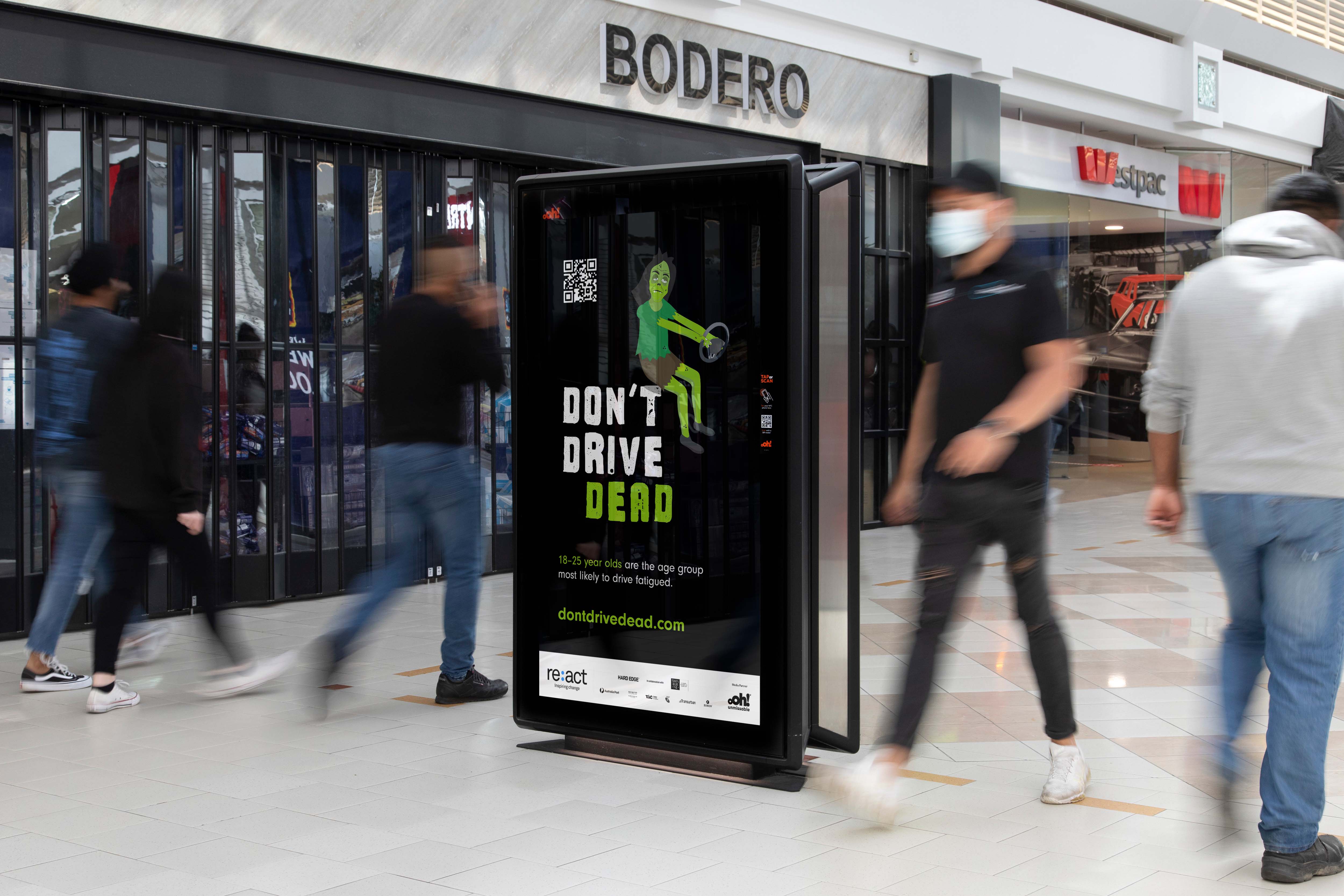Swinburne students use zombies in road safety campaign

The ‘Don’t Drive Dead’ campaign has been selected as the Victorian campaign for Re:act 2021
In summary
- A group of Swinburne students have seen their 'Don't Drive Dead' road safety messaging selected as the Victorian campaign for Re:act 2021 and will be displayed from 6 December to 19 December 2021
- Eve Uittenbosch, Lulu Nicholls, Charlotte Tiong and Gabrielle Versace created the zombie-inspired campaign to bring awareness to the dangers of driver fatigue
- Re:act is a program that challenges university students to raise awareness of road safety issues among 16-25-year-olds, change driving behaviour and make all road users safe
A striking campaign created by Swinburne students has been selected as the Victorian campaign for the road safety program Re:act 2021, and will educate young drivers about the risk of driving fatigue.
Eve Uittenbosch, Lulu Nicholls, Charlotte Tiong and Gabrielle Versace are the third year Communication Design honours students behind the selected campaign which will launch from 6 December to 19 December 2021. They used zombies and the ‘Don’t Drive Dead’ tagline to bring awareness to the risks of driving fatigued.
Re:act is a program that challenges university and college students to raise awareness of road safety issues among 16-25-year-olds, change driving behaviour and make all road users safer. Selected campaigns, including ‘Don’t Drive Dead’, will be developed with advertising agency Hard Edge . They will be displayed on billboards, bus stops and other public media assets managed by oOh!media.
Re:act was created by Hard Edge in 2016 in collaboration with Swinburne University of Technology. Since launching, it has rapidly expanded internationally, as well as to the TAFE sector within Australia.

The ‘Don’t Drive Dead’ campaign was inspired by pop culture’s frequent use of zombies
Apocalypse of awareness
Swinburne student Gabrielle Versace says the group wanted to create a relatable campaign and that, since participating, they’ve found the message affecting their own lives.
‘Something we saw in popular culture was the zombie genre. We liked the idea of a character that represented the state of being fatigued. “You look dead” is something our age group will often say to each other when we recognise someone is looking tired, so we liked that connection with being fatigued and how the zombie character could represent that.’
‘After doing Re:act we realised, especially driving to university and then to work, that people in our age group are frequently on the road fatigued, without even realising. We found we kept using our campaign tagline in our own lives – “guys, don’t drive dead if you’re feeling tired” – so we started holding each other accountable, which is great because that’s what we wanted our campaign to do with the audience.'

Swinburne students demonstrate how augmented reality could be incorporated into the campaign at Federation Square, Melbourne
Saving lives
Re:act founder, Andrew Hardwick, acknowledges the ‘inspired use of zombies’ that are popular in various media forms right now and commends the students’ efforts despite the challenges brought by COVID-19.
Stephen Hehir from Re:act program partner Australia Post says that the company takes the importance of driver fatigue seriously with many of its employees on the road every day.
‘The Swinburne Media and Communications students this year all demonstrated a “felt” understanding of the driver fatigue issue and all delivered adept campaigns, evidenced by the challenge the adjudicators had in determining the selected campaign. Congratulations to the team with the cut through message, ‘Don’t Drive Dead’,’ Mr Hehir says.
-
Media Enquiries
Related articles
-

- Student News
- Social Affairs
How Michael is creating change centred in culture
Swinburne student Michael Phelan founded the Reconnect mentoring program at the Bimberi Youth Justice Centre
Monday 02 March 2026 -

- University
- Student News
Swinburne secures New Colombo Plan funding, expanding global opportunities for students
Swinburne has secured $943,000 in New Colombo Plan funding, expanding student opportunities for study, work and internships across the Indo-Pacific
Friday 06 February 2026 -

- Design
- Technology
- Health
- Law
- Education
- Business
- Science
- University
- Engineering
Swinburne moves up in Times Higher Education World University Rankings by Subject 2026
Swinburne University of Technology has performed strongly in the Times Higher Education World University Rankings by Subject 2026, with two subjects moving up the ranks.
Thursday 22 January 2026 -

- Student News
- Science
- Sustainability
Introducing tomorrow’s global science communicators
Start Talking is Swinburne’s unique video-based public speaking competition, exclusively for undergraduate students
Monday 08 December 2025 -

- Student News
2025 Swinburne Student Association Awards celebrate standout clubs and students
The 2025 Swinburne Student Association Awards celebrate the standout achievements of clubs, athletes and volunteers who make Swinburne a vibrant and inclusive community.
Tuesday 16 December 2025

